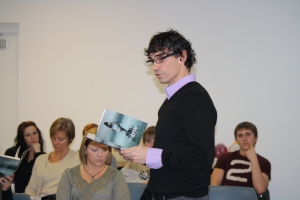 In a recent interview, I was asked how I decide which portion of my novel to perform during a public reading. I used the word “perform” because for a reading to be successful, it must be a performance. This can be a major block for authors lacking a theatrical flair. It’s exceedingly difficult enough to pry people from off their couches and from their computers to take the trouble of getting themselves to a local library, university, or bookstore for a reading. If all the author provides is a vocalization of what the reader could have done for himself at home, there is very little likelihood that reader will be entertained or ever attend another reading. The best readings I’ve attended have been like one-man plays in which the author adapts his voice, facial expressions, and body language to match the characters for whom he speaks. Therefore, my first criteria for choosing an excerpt for reading is to choose a section heavy in dialogue and play the roles I’ve created. Said another way, I avoid reading long blocks of explanatory text, especially that which does little more than establish setting or directly characterize.
In a recent interview, I was asked how I decide which portion of my novel to perform during a public reading. I used the word “perform” because for a reading to be successful, it must be a performance. This can be a major block for authors lacking a theatrical flair. It’s exceedingly difficult enough to pry people from off their couches and from their computers to take the trouble of getting themselves to a local library, university, or bookstore for a reading. If all the author provides is a vocalization of what the reader could have done for himself at home, there is very little likelihood that reader will be entertained or ever attend another reading. The best readings I’ve attended have been like one-man plays in which the author adapts his voice, facial expressions, and body language to match the characters for whom he speaks. Therefore, my first criteria for choosing an excerpt for reading is to choose a section heavy in dialogue and play the roles I’ve created. Said another way, I avoid reading long blocks of explanatory text, especially that which does little more than establish setting or directly characterize.
A second criterion pertains to how long the book has been available to the public. If the reading is to take place in the weeks to first few months after the novel’s release, I prefer to read from the beginning. There is no better place to start, and the reading will often serve to whet the appetite of the audience and to inspire their purchase of the novel. However, if the novel has been on shelves for months, and there is a good likelihood that a large portion of the audience will already have read the book, I like to choose a section that works as a self-contained mini-narrative even when excised from the story as a whole. I often find these excerpts buried in the sub-plot of the novel. I have found this sort of audience to find greater satisfaction by such a reading.
A third consideration is the make-up of the audience. I often change my choice of material at the very last minute based upon those actually in attendance rather than those “ideal readers,” to borrow Stephen King’s title,” I had imagined would fill the seats. For example, in my debut novel, So Shelly, the teenage characters use a fair amount of what many would consider vulgar language, including the “F”-word. If I notice a number of young children or elderly patrons, who are typically the ones most offended, I will read from a sectionthat makes minimal use of that sort of language. Although I relish the opportunity to offend my readers beliefs and values as a means of forcing them to examine them more closely, offending the reader or audience through the use of vulgarities is a cheap trick of little substantive value.
Finally, the most important criterion in choosing an excerpt for performance in a public setting is to select a portion which can be read in no more than fifteen minutes. If I go beyond that, I find some grow restless and lose interest. Remember, these are readers. Let them read.